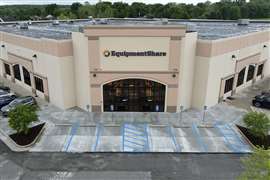Cloud nine? What are the benefits of cloud computing for rental companies?
31 January 2012
Cloud computing - using software hosted on a remote server - has become a real option for rental companies large and small. Murray Pollok asked rental software companies about the pros and cons of shifting away from the traditional ‘on-premise' model.
Paul Chapdelaine is probably the wrong person to ask about ‘cloud computing', since he has a rather partial view. "100% of our customers are using a hosted solution", the president of RMI Corp tells IRN, "About a year ago we stopped offering on-premise systems."
The decision to shift entirely from offering traditional on-premise rental software systems to a hosted or ‘cloud' offering - one he describes as "brave, or completely stupid" - was made in the face of difficult business conditions; "We'd been offering the cloud for about five years, so we said, why not switch and go completely to the cloud?"
It's a decision he does not regret, having installed around 35-40 systems in the last year with an average of around 7.5 users/system.
RMI's decision may be at the extreme end of the spectrum, but the greater emphasis on cloud computing, or Software as a Service (SaaS), is evident right across the computer world, both inside businesses and in the home.
If you use an e-mail account like Gmail or Hotmail, store photos on a website, do your banking online or use file back-up services such as Dropbox, then you are on the cloud.
The recent shift towards the cloud is due in part because it is being pushed by the biggest names in web services and IT. Amazon is one of the largest hosting companies, renting its enormous server capacity to businesses all over the world; Apple is busy promoting its iCloud services; and Microsoft has recently launched Office 365, which gives users online access to common applications such as World, Excel and Powerpoint for a monthly fee.
The great benefit of the cloud is that you outsource the IT hardware such as servers to a hosting company. In addition to maintaining the servers, your hosting company will also back-up your data and generally manage the hardware and data in a professional manner. That leaves you to focus on your own business, simply accesses the data and applications via a web browser in your office or in the field via mobile devices.
Internet connection
That means that a critical component of the cloud is your internet connection. "The drive towards hosted services is significantly greater today because the infrastructure is there. And as we see fibre optic networks rolling out we will see improvements. If we get that we're set", says Chris Branson, chief executive officer of UK-based rental software company Insphire, and another advocate of the cloud.
A relatively small proportion of Insphire's new customers opt for the cloud solution, but Mr Branson says that is going to change; "It's still early days. Today, the infrastructure is there, but it's not been there for very long. It's a viable option - two years ago that might not have been the case."
He recalls Insphire launching an eCommerce platform in 2001; "We went to the Hirex show and nobody bought it. Today, every one of our customers says they need to be on the web. They could have had it ten years ago. It takes time for a new offering to be understood."
Jack Shea, chief operating officer at Solutions by Computer in the US, says the general buzz about cloud computing is making business owners "more comfortable with the idea of utilising the Internet as a channel to access software, as opposed to housing the programs on hardware at the business.
"It can be particularly appealing in the rental industry because the rental environment is famous for being harsh on computer systems, and for the most part that's a non-issue with cloud."
Also noticing a "huge change" is Matthew Bridge, a senior solutions consultant at Lawson Software, the company recently acquired by Infor and which targets larger rental installations.
However, he says that change has yet to filter through completely to the rental sector; "We're seeing less than 10% [of installations going to the cloud] - not because it's not a good solution. I think people are still a bit scared. They are happier being able to see and touch a box."
If some renters are still to be convinced, certain types of companies are easier to persuade than others
Slow adapter?
Nick Thomson, sales manager at MCS - which is seeing around 40% of new customers opting for the cloud - says the choice depends on what the company wants to do; "Do they feel they will expand quickly, take on new technology at a quick rate, or are they a slow adapter?
"If they are not a quick changer, then their current infrastructure might be fine. Hosting can be more flexible. With the cloud environment it's easier to move things forward and take on new technology", says Mr Thomson.
"They all do it for their own reasons. It's very personal to the business. Some don't want servers, a low CapEx model. Some want to use their website for customer web portals. To set up that network in a traditional system is quite technical".
For small companies, who don't have a dedicated IT staff or expertise, the cloud gives them the opportunity to source that knowledge. For larger companies, who already have IT expertise, then the cloud offers the option of cutting costs by reducing the size of their IT departments, or diverting their IT staff to focusing on fully exploiting the software that they operate.
The argument for start-up companies is particularly powerful. Mr Thomson at MCS cites a new traffic management rental company that is using a hosted solution for all its software, even ‘bread and butter' applications such as Word and Excel. In that case, MCS simply uploaded its software to the hosting company.
In the US, Wynne Systems is finding demand for the cloud even among larger companies; "Over the past few years we have found that the majority of companies, even large corporations with hundreds of locations, prefer the more hands-off ‘cloud' solution. Cloud computing eliminates the need for an IT staff, the cost of ownership for servers, backup systems and the related software."
Forward costs
Of course, if you have recently invested heavily in IT equipment, then your choice may be different. "If you've just made a major investment in IT, then I would understand [not opting for a cloud solution]", says RMI's Paul Chapdelaine. But he points out that "it is the costs going forward that count. You have to consider maintenance costs - forward costs."
Jack Shea at Solutions by Computer says the cloud is proving popular with smaller rental companies, and this brings particular benefits; "In small- to mid-sized rental businesses, where employees charged with IT system management typically have customer-facing roles as well, cloud computing can be a way to let the staff focus more intently on rental."
Wynne Systems agrees; "Many small and medium companies may not have dedicated IT personnel. That role is often filled by a senior person, whose time is better spent as a business knowledge worker than a makeshift computer system operator. This is an area where soft costs are obviously recouped because the cloud provider takes on these roles."
For Chris Branson at Insphire the cloud offers the simplicity and transparency of having a single, monthly cost, with no ‘surprise costs', "There are substantial cost benefits in going down the cloud route - there is one monthly fee. It's a compelling argument." A single monthly fee will typically include licences, hosting fees, software, and entitlement to free upgrades.
There is also more inbuilt flexibility in the hosted model. Nick Thomson at MCS says fees can drop with smaller numbers of users - following redundancies, for example. Those kinds of savings are more difficult to realize if you buy a server for 15 people and find yourself operating with just 10. Likewise, adding capacity is much easier in the event of rapid growth, or an acquisition.
The cost of obtaining server space is also coming down as capacity is added. Paul Chapdelaine says that since starting to offer hosted solutions RMI has been able to pass on three significant price reductions to customers.
Another key benefit is upgrades. Mr Chapdelaine says that with the on-premise model, if RMI had a new product "it took three years for all the existing customers to have access to the new technology. Under the cloud, every 90 days we upgrade all our customers. We do it during the evening, making small bite-sized improvements."
There are also some less obvious cost-savings. "Companies have told us that their utility bill went down $1500 because they no longer had a server room", says Mr Chapdelaine, "The server room is a mini-oven, and there is an air conditioner fighting that oven."
Security issue
The benefits are pretty easy to explain, but there is one big issue that always surrounds the cloud, and that is security of data.
Chris Branson at Insphire turns the questions round; "How secure is the server under your desk? You have to go to pretty large companies to have a well maintained server....and what does it cost when the server fails? Your business could be down for a day. At Amazon, another server immediately comes online."
That view is echoed by Julian Archer, product and industry marketing director at Lawson Software; "What's more secure: Amazon or the little box in the middle of an office in a rental company? Security is a red-herring."
In fact, security with a hosted solution could be considered a benefit. Paul Chapdelaine at RMI says professional hosting companies ensure that data is backed-up and that there is a disaster plan in place; "Data centres are run by professional people whose sole purpose in life is to protect your data." He says one of his customers in the US actually reported lower insurance costs because the hosting company had a credible disaster plan.
Wynne Systems says cloud providers need to have tight security measures in place to safeguard customer data; "In many cases, this means that the cloud providers are making greater investments into their security infrastructures."
The company points out, however, that security is still required at the rental company; "One of the biggest areas of data theft occurs from within the organisation. Have a process or plan in place to make sure that employees do not have access to data once they are let go."
There are also sensible precautions to take. Since you are reliant on a good broadband connection, companies need to have safeguards. Nick Thomson at MCS says rental companies need to have service level agreements with broadband suppliers, stipulating response times in the event of a problem; "If all your business is on the cloud, telephone lines are your only links..."
And what about getting access to your data, particularly if you are having financial problems and perhaps missed a software/hosting subscription?
"We'd talk it through with the customer and get through it", says Mr Thomson, "We had one customer that went bankrupt - we negotiated with the administrator. We don't just switch it off - that doesn't do anybody any favours."
Of course, the reality is that most rental companies continue with the ‘on-premise' solution. And as Wynne Systems makes clear, sometimes that makes sense; "Not all solutions work best in a hosted environment. In order to fully know what solution will fit your company best, you must assess your business needs and infrastructure before making a decision.
"On Premise solutions allow a company to have control over all systems and data. Data is stored, maintained and protected internally. In house IT personnel know the specific needs of the company and maintain and support the system. Some licensing options also allow the company to make their own developments to the product, which makes the on premise option appealing."
Still unconvinced?
For those who remain unconvinced, there doesn't have to be an either/or solution, you can also opt for now/later. Hewden in the UK, for example, has just chosen to invest in a traditional on-premise Microsoft system, being installed by Maxima, but with the option of migrating to the cloud at a later date. Wynne Systems, meanwhile, points out that it is easy to transition its RentalMan system from the on-premise to a hosted version.
Still, it is clear which way the traffic is going. The rental industry's traditional conservatism in IT will not prevent the cloud's inevitable ‘victory'. Wynne Systems believes that within five years the majority of rental ERP implementations will be hosted solutions.
We started this article with a cloud ‘champion', Paul Chapdelaine, so we might as well give him the final word. "I'm not saying that the whole world should switch to the cloud today, but they should be planning their move. On-line banking, storing data on the cloud: you're already integrated there. It's tough to imagine it with your ERP system, but when you think about it, it just makes perfect sense."
BOX STORY
Tracking gensets in the cloud
Worldwide Power Products (WPP), the Houston, Texas-based company rents, buys and sells new and used generators and engines, has deployed a ‘cloud-based' equipment maintenance tracking system for its rental business.
WPP is using SaaSMaint.com's CMMS/EAM system to track the maintenance and operation of equipment in its rental division. It will generate maintenance reminders for rental customers and manage equipment maintenance records.
"We needed a way to keep track of our maintenance, and to make sure used equipment runs when it comes in," said WPP's IT manger Andrew Adams. "This is the best automated solution for that. We can also track whether it is costing more to keep a unit rather than to replace, salvage and move it off inventory."
An added benefit for WPP is that the SaaSMaint application is integrated with the Salesforce CRM software that it already uses; "The fact that we didn't need to learn anything new was a definite benefit. And, since it is integrated into Salesforce, we didn't have to worry about installing anything on a local server, either."
BOX STORY
IT highlights
Zeppelin's rental business in Germany (formerly MVS Zeppelin) is using the CrowdWorx online surveying tool to collect predictions on future revenue and utilisation levels from its employees. The system allows Zeppelin to gather a wide range of views from hundreds of employees and also gives staff the opportunity to have an influence on decision making.
Canada's Orion Software has signed an agreement with payment processing company Mercury Payment Systems that will allow Orion's rental management software SiriusPro to offer direct credit card payments.
Uses of RMI Corp's Advantage rental management system will now be able to report on future planned maintenance services for both its own fleet and that of its customers by using the new Planned Maintenance Schedule Report. The report enables service departments and dispatchers to review planned maintenance services and helps companies schedule work.
Hewden in the UK has signed a "multi-million pound" contract with IT supplier Maxima for a Microsoft business management and CRM (customer relationship management) system. Maxima will initially deploy the software at Hewden's locations, but will provide the option of moving to a hosted, ‘cloud-enabled' system in the future. See the March-April issue of IRN for an interview with Kevin Parkes, Hewden's CEO, about the new system.






